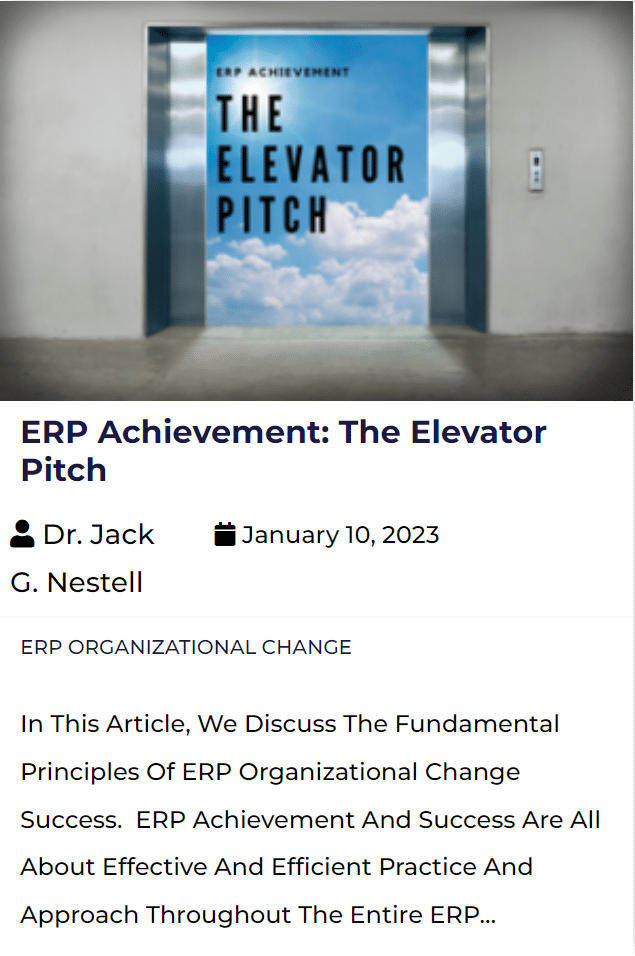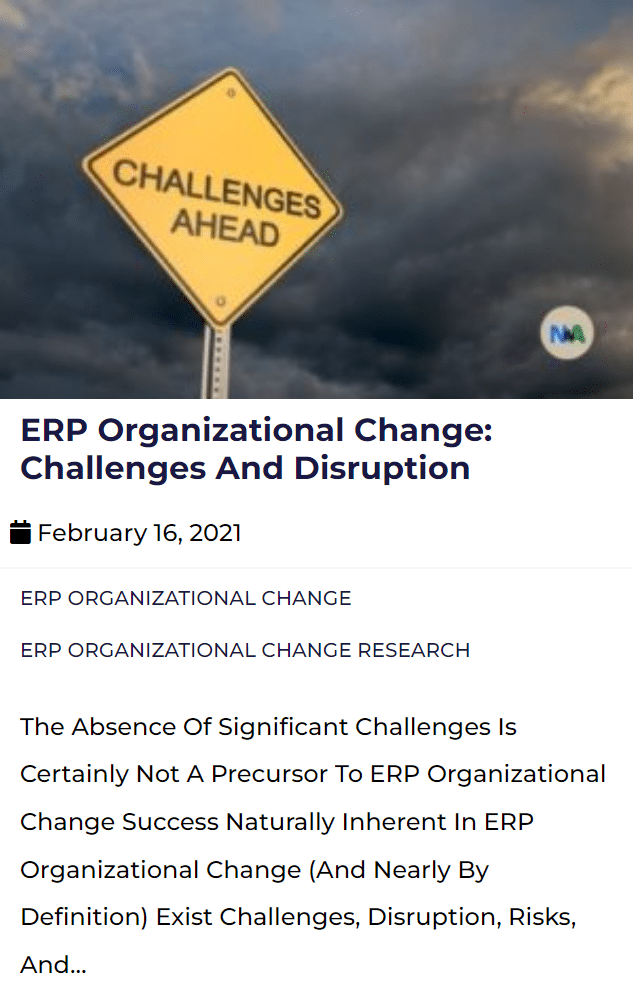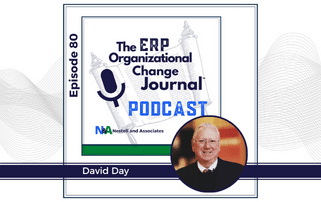Article Contents
- Organizational Culture is Much More Than a Buzzword
- Portfolio Organizational Culture is a Key to Successful Risk Management
- ERP Organizational Change: A Valuable But Risky Proposition
- ERP Organizational Change: The Value of Organizational Culture is Clear
- ERP Organizational Culture Risk Management: Measuring for Success
- Measuring Organizational Culture: The Tool (Founded in Sound Research and Principle)
- Risk Management Practices, Procedures, Acceptance, & Policies Need to be Successfully Implemented
Organizational Culture is Much More Than a Buzzword
In the context of organizational culture’s impact on ERP Risk Management Strategies, it’s insightful to reference D.D. Warrick’s work from his 2017 Business Horizons article, ‘What leaders need to know about organizational culture.’
Warrick underscores the profound effect of organizational culture on company success, employee morale, and talent retention. He identifies key challenges leaders face in understanding and nurturing culture, noting that it’s a complex task beyond mere acknowledgment.
This perspective reinforces the three critical aspects highlighted in our article, emphasizing that a well-developed organizational culture is integral to the success of ERP initiatives. For a deeper understanding, Warrick’s article is available here.
Portfolio Organizational Culture is a Key to Successful Risk Management
Research-based evidence suggests that no company should engage in a large-scale multi-million-dollar ERP project without adequate organizational change assessment and readiness. A direct link exists between corporate culture, organizational performance, and de-risking large-scale ERP organizational change.
Research from Denison Consulting suggests that when analyzing top and bottom-performing organizations for risk management and their corresponding culture scores there is a positive correlation between culture and risk management. Dr. Denison is one of the pioneers in the field of organizational culture and assessment. Dr. Denison’s research was the foundation of the Denison Culture Model and the Organizational Culture Survey, out of which the practice of measuring and consulting on organizational culture has emerged with Denison Consulting beginning in 1998.
Based on Denison’s research, corporate cultural indicators of Risk Management for successful organizational change scenarios include organization-wide consensus on how much risk to take, alignment on areas of business where risk-taking is acceptable, continuous monitoring of old and new risks, leadership support for appropriate risk-taking behaviors and awareness, and employees that are comfortable discussing risks. Since ERP organizational change can create many risk opportunities as well as be impacted by many risk factors, portfolio organizational culture is a key to successful risk management.
ERP Organizational Change: A Valuable But Risky Proposition
- ERP systems are widely accepted as one of the best mechanisms for organizations to gain competitive advantage (Sekulić, Lolić, & Stefanović, 2018).
- ERP systems, when integrated with ERP Risk Management Strategies, can bring value to organizations such as improved accuracy and visibility, increased process efficiencies, and improved integration of business units. However, the process of ERP organizational change and implementation can create significant business risks. Al-Shamlan and Al-Mudimigh (2011), as well as Al-Fawaz, Al-Salti and Eldabi (2008), describe ERP implementation failure rates between 60-90%, which demonstrates ERP organizational change failures is a problem.
While the definition of failure can be defined differently and certainly can be subjective, the risks are real. In fact, culture-based and culture-induced risks can become large-scale incidents and result in a significant amount of wasted time, money, effort, and even organizational reputation.
- The risk to the organization’s ERP assimilation goal if success is not achieved could also lead to a loss in production, a decrease of product quality, loss of customers, decrease in profits, loss of sales, plant closure, bankruptcy (Scott, 1999), and potentially even lawsuits (Grossman & Walsh, 2004).
All of these circumstances are documented in literature, case studies, and articles with evidence demonstrating that ERP failure is extremely costly to U.S. organizations.
ERP Organizational Change: The Value of Organizational Culture is Clear
ERP assimilation risk is a significant problem directly related to many complex and dynamic factors. As proposed “successful” ERP implementation factor research has evolved, research is, and has, also considered the non-technical side of ERP organizational change in an effort to understand how leadership, organizational culture, team performance and measurement, and diversity might be important.
Research clearly demonstrates the value and criticality of corporate culture;
- Corporate culture is an elaborate system of norms and values that evolve over time and is the collective binding that governs the values, ideals, and beliefs shared within the organization (Ke & Wei, 2008).
- Organizational culture and organization-related influences are necessary to understand because as described by Denison, Haaland, and Goelzer (2003), organizational culture characteristics, which can be measured and monitored, may have a predictable impact on the effectiveness of organizational change. Therefore, organizational culture can be impactful in determining perceptions and behaviors and it is a key concept to note in terms of how organizational culture can impact change and success.
- Ke and Wei (2008) described that when there exist varying and mixed cultures of leadership within organizations, employees will have different ideals, perceptions, and understandings of ERP organizational change efforts, which has a direct impact on change acceptance from the employees.
- Annamalai and Ramayah (2013) established that organizational culture regulates the relationship between success factors and assimilation success of the ERP projects.
- Annamalai and Ramayah (2013) further state that organizational culture must highlight the value of common goals. Phenomena at individual, group, organization and society levels determine the use of ERP systems, and utilizing a context-aware perspective has to begin with the awareness and notion that an ERP is not just a physical artifact but also an artifact of an organization’s culture (Howcroft, Newell, & Wagner, 2004).
- Furthermore, Ifinedo (2017, p. 38) states that “On the organizational cultural front, firms planning to adopt and those that have already adopted ERP must ensure that collaborative, cooperative, and, supportive attitudes are promoted in the organization. Our data analysis revealed that ERP success may be enhanced when such cultural attributes are rated highly.”
- Denison research has also demonstrated a clear link between organizational culture and business metrics and can clearly demonstrate the ROI of culture change efforts (Denison, 1984; Denison & Mishra).
The significant value of healthy organizational culture as a key factor to ERP assimilation success cannot be denied.
ERP Organizational Culture Risk Management: Measuring for Success
- Denison (1984) states that the primary and fundamental identity of an organization is based on its organizational culture: the set of values, beliefs, and behavior patterns. One way to mitigate risks is to therefore understand and measure your organizational culture “temperature”.
There are organizational change influences that culture impacts and that also increases the likelihood of ERP organizational change success. Research has demonstrated that culture can be measured and be of significant organizational value.
- The Denison Model was built to explain the cultural factors leading to financial performance and organizational effectiveness (Denison, 1990).
For the success of the organization, there are specific cultural conditions influencing the organization that should be measured and then appropriately acted upon. It is important to get a strong sense of where an organization’s culture is prior to any significant change effort takes shape. Why? If you agree that culture is important to your company’s success, would you not want to know as much about the culture as possible before investing your resources?
Measuring how employees perceive the organization’s culture can help surface departments or teams that are aligned and working effectively – and others that are not – so cultural best practices can be shared across the organization. If the culture isn’t aligned with the change effort and there is not widespread buy-in to it, it simply won’t work.
As Dr. Brown (Nestell & Associates Strategic Advisor) says;
“Different types of enterprises have more complex strategies and operational activities comprising them than others, yet with a cultural lens we can see how well a company translates its mission and strategic intent into a measure of capability development at the operational level. How well does the culture translate ideas into action that has impact?”
ERP Organizational Change Practical Tip: Objectively Measure Your Organizational Culture
Recently “culture” appears to have become even more and more of a buzzword when it comes to digital transformations or ERP organizational change. However, Private Equity portfolios can drastically de-risk their ERP organizational change by building into the project plan deliberate, intentional, and concrete activity in which to measure, promote, build, and encourage organizational teamwork just for an ERP project. As long as there are organizations, ERP organizational change will include people/culture, processes, and technology.
As long as ERP solutions are being used by human beings and business cultures, the criticality of the dynamic interplay between the people/culture, processes, and technology triad is not going anywhere and will always play a significant role in successful ERP organizational change.
Measuring Organizational Culture: The Tool (Founded in Sound Research and Principle)
The de-risk solution lies in an effective and proven tool. During ERP organization change, organizations face risks daily and need a system in place to deal with them. The risks of the modern work environment are plentiful: increasing industry regulations, stakeholder pressure to grow and reach new levels of profitability, and the rapid advancement of technology, not to mention increasingly volatile international trade relationships and markets. These factors underscore the need for a systematic approach to risk management that considers the underlying culture of the organization, a leading driver of risk management.
The Denison Risk Management Content module measures the effectiveness of risk management practices in an organization and is designed to complement the Denison Organizational Culture Survey (DOCS) by specifically capturing employee perceptions of various aspects of risk management.
In addition, Denison’s core culture model includes assessments like Engagement, Commitment, Innovation, and Diversity & Inclusion, which are considered employee outcomes that are impacted by organizational culture and have a significant influence on ERP organizational change.
At its core, risk management is about how organizations detect and respond to risks and change. Risks are forces or conditions that threaten to inhibit the success of organizational change.
Effective risk management involves several core capabilities and a specific mindset. Organizations with effective risk management practices are hyper-vigilant – they continually look out for and monitor risks. In these organizations, employees speak up about risks and leaders listen to concerns and encourage honest discussions around them. Also, employees are clear about the appropriate level of risk to take and how to handle risks when they arise.
Private equity portfolios can use a scientifically based and proven method to de-risk ERP organizational change.
Risk Management Practices, Procedures, Acceptance, and Policies Need to be Successfully Implemented
Preliminary research from Denison Consulting reveals that risk management is most related to the organizational characteristics of empowerment, agreement, coordination & integration, and core values. These are all significant factors in ERP organizational change success.
Specifically, to achieve successful change via effective risk management, it is important to establish a consistent and predictable approach to business (and ERP organizational change) that is widely agreed upon across different levels and business areas of the organization. Decision-making must be delegated to the level where the best information is available, and that information must be widely shared.
And, there must be a clear set of values communicated and practiced by leaders within the organization. Organizational culture influences the deployment and effectiveness of risk management, as well as the amount of risk-taking that employees perceive, is acceptable. For successful ERP organizational change, risk management practices, procedures, and policies need to be successfully implemented.
Risk management needs to be integrated into an organization’s culture. Changing policies and practices without changing culture can lead to compliance without adoption, undermining risk management efforts. Failure to integrate risk management into the culture of an organization is one of the top barriers to managing risks effectively.
Formal risk management control mechanisms dictate what the organization and its people should do, whereas culture dictates what people really do. Rules and regulations do help but it is not as simple as ‘the more the better.’ A prominent feature in many incidents is that the system underlying risk management broke down, not because of the way risk was managed via policies and procedures, but because the organizational culture did not place an emphasis on managing risks and change.
Organizational culture heavily influences employee behavior and attitudes and is considered a leading risk factor in companies’ organizational change success. As Hartl and Hess (2017) state in their article ‘The Role of Cultural Values for Digital Transformation: Insights from a Delphi Study,’ culture is often understood to be a valuable strategic asset with incredible potential to promote and sustain organizational change with the deployment of digital technologies, and organizational culture can also be a significant factor contributing to change prevention. ‘In research and practice alike, cultural change is perceived as essential for successful business transformation.’ (Hartl & Hess, 2017).”
In conclusion
The synergy between ERP success and organizational culture is undeniable. No doubts, a positive and healthy organizational culture is a competitive advantage. As industries continue to evolve and digital transformations gain momentum, the importance of embedding a conducive organizational culture becomes paramount. Successful ERP initiatives are not just about integrating top-tier technologies; they’re also about cultivating an environment where risk is effectively managed, where values are consistently practiced, and where the entire organization is aligned toward a shared vision of change.
By giving organizational culture its rightful emphasis and leveraging tools like the Denison Model, businesses can significantly elevate their chances of ERP success, ensuring not just compliance but true adoption and transformative growth. As we journey forward, let’s remember that it’s the people, their beliefs, and shared values that ultimately drive the success of any technological venture.
Finally, the effective implementation of ERP Organizational Culture Risk Management and ERP Risk Management Strategies is essential for the transformative growth and success of ERP projects.
Dr. Jack G. Nestell
Ready to elevate your ERP initiatives?
Referrences
Al-Shamlan, H. M., & Al-Mudimigh, A. S. (2011). The Chang management strategies and processes for successful ERP implementation: A case study of MADAR. International Journal of Computer Science Issues, 8(2), 399.
Annamalai, C., & Ramayah, T. (2013). Does the organizational culture act as a moderator in Indian enterprise resource planning (ERP) projects? An empirical study. Journal of Manufacturing Technology Management, 24(4), 555–587. https://doi.org/10.1108/17410381311327404
Berić, Lolic, & Stefanovic (2018). “Evolution of ERP Systems in SMEs–Past Research, Present Findings and Future Directions.”
Denison, D. R. (1984). Bringing corporate culture to the bottom line. Organizational Dynamics, 13(2), 5–22. https://doi.org/10.1016/0090-2616(84)90015-9
Denison, D. R. (1990). Corporate culture and organizational effectiveness, John Wiley & Sons.
Denison, D. R., Haaland, S., & Goelzer, P. (2003). Corporate culture and organizational effectiveness: Is there a similar pattern around the world. Advances in Global Leadership, 3(2), 205–225. https://doi.org/10.1016/S1535-1203(02)03011-3
Denison, D. R. and A. K. Mishra (1995). “Toward a theory of organizational culture and effectiveness.” Organization science 6(2): 204-223.
Grossman, T. and J. Walsh (2004). “Avoiding the Pitfalls of Erp System Implementation.” Information Systems Management 21(2): 38-42.
Hartl, E. and T. Hess (2017). “The role of cultural values for digital transformation: Insights from a Delphi study.”
Howcroft, D., Newell, S., & Wagner, E. (2004). Understanding the contextual influences on enterprise system design, implementation, use and evaluation. The Journal of Strategic Information Systems, 13(4), 271–277. https://doi.org/10.1016/j.jsis.2004.11.010
Ifinedo, P., & Nahar, N. (2009). Interactions between contingency, organizational IT factors, and ERP success. Industrial Management & Data Systems, 109(1), 118–137. https://doi.org/10.1108/02635570910926627
Ke, W., & Wei, K. K. (2008). Organizational culture and leadership in ERP implementation. Decision Support Systems, 45(2), 208–218. https://doi.org/10.1016/j.dss.2007.02.002
Scott, J. (1999). The FoxMeyer Drugs bankruptcy: Was it a failure of ERP? AMCIS 1999 Proceedings, 80.
Warrick, D. D. (2017). “What leaders need to know about organizational culture.” Business Horizons 60(3): 395-404.
Related Articles
Related Podcasts
Episode 80: Are You an Effective ERP Change Leader? Traits, Strategies, and Insights
More Related Podcasts
About Nestell & Associates
Where People, Processes, and Technology Align
Nestell & Associates specializes in providing M&A ERP and IT consulting services for private equity firms and their portfolio companies. We offer a range of vendor-neutral services to support all stages of the investment cycle.
Moreover, we know how to effectively minimize or eliminate the issues you experience during M&A. With Private Equity Technology Solutions as 100% of our business, we bring a unique approach to ERP that other firms can’t compete with.





